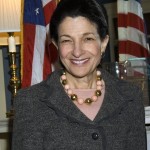December 20, 2013
Senator Olympia Snowe Encourages Scientists to Make Their Voices Heard
Posted by Erik Hankin
The large auditorium was standing-room only for former Senator Olympia Snowe’s (R-Maine) address at AGU’s 2013 Fall Meeting. An ally with a history of standing up for many of AGU’s key issues on and off Capitol Hill, Senator Snowe resigned in January of 2013 over what she saw as an increasingly inept and hyper-partisan atmosphere in Congress.
During her time in the Senate, Snowe positioned herself in the middle of the emerging climate debate, sharply contrasting members of her own party in sounding the alarm over human-induced changes seen at the global level. In 2004, she released three statements expressing concern over NOAA findings that the emission of CO2 and other heat-trapping gasses were linked to the increase in global warming activity. From that point forward, she supported many climate change-related actions, including: Cap-and-Trade legislation, an increase in Corporate Average Fuel Economy (CAFE) standards, federal and state agencies that conducted climate change research, a resolution to bring the U.S. back to negotiating table over global climate standards, and much, much more.
Throughout her speech, Senator Snowe referenced her work in an effort to paint a picture of what used to be possible in Congress, and how the current scenario has shifted to one of dysfunction and discord. “I was in Congress long enough to experience first-hand what can be accomplished when people of various political backgrounds and philosophies are determined to solve a problem,” she said, “even and especially during perilous times.” The current situation, in her words, is much more grim. “Today, bipartisan collaboration is probably as rare as a dinosaur sighting.”
Speaking directly to the budgetary pain and uncertainty that many scientists have felt lately, she said;
“You as members of the scientific community are ensnared in the polarizing politics and the legislative dysfunction that has ensued. You’re caught in the confluence of burgeoning federal deficits, a congress that’s unwilling to sort through the issues and their differences, and as a result the indiscriminate and blunt instrument of the sequester, or automatic cuts, across the board that has affected so many of the agencies that you are a part of and also to even consider policies that are so essential to address or to mitigate consequential issues such as climate change.”
Much of her tone, reflecting our current state of affairs, was depressing. However, she also spoke hopefully about the impact scientists can have moving forward. “Your voice does matter,” the Senator said. “You must not underestimate the impact and the effects and the influence that you have to bring to table.” Connecting the dots for staff and their bosses, acting as a witness, and getting involved in elections were several of the many ways Senator Snowe listed as tools to bring about real and meaningful change in the climate debate, and in fixing the political system as a whole. “We need forces to unite,” she said, “and that’s why we need you to weigh in and make you voices heard.”
To find out how you can get involved in science policy and make an impact, sign up today for our “Science is Essential” campaign. Enter your information, and you’ll receive an email which will allow you to choose your level of involvement.
You can view Senator Snowe’s speech on-demand. If you don’t have a Fall Meeting on-demand account, sign-up today and use the code “AGU13” for free access to all the recorded sessions from the Fall Meeting.
–Nick Saab, AGU Public Affairs Specialist


